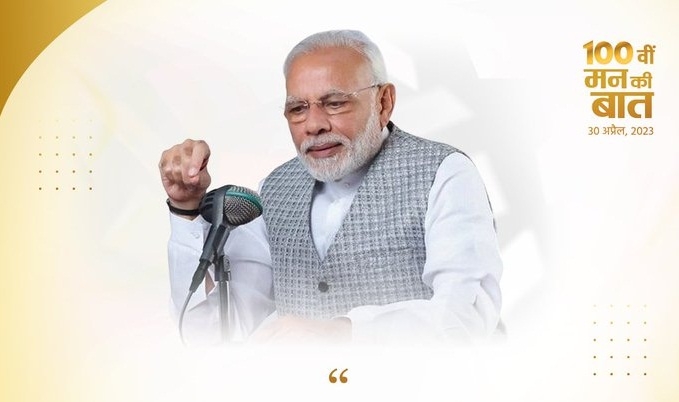

Prime Minister Narendra Modi addresses his 100th episode of 'Mann Ki Baat' (Photo: IANS)
Prime Minister Narendra Modi, who addressed the historic 100th episode of ‘Mann Ki Baat’ on Sunday, described his connection with the popular monthly radio programme likening it to “Prasad Ki Thaal” (offering to God) and said that it has become a “spiritual journey” for him.
“Like when people go to worship God, they bring along a Thaal of Prasad. For me, ‘Mann Ki Baat’ is like a ‘Prasad Ki Thaal’ at the feet of God in the form of ‘Janata-Janardan’, the people. ‘Mann Ki Baat’ has become a spiritual journey of my being. ‘Mann Ki Baat’ is a journey from the self to the collective. ‘Mann Ki Baat’ is a journey from myself to ourselves. It is not me, but you are its Sanskar Sadhana,” PM Modi said. The Prime Minister mentioned women empowerment during his show and that how his monthly radio programme became a platform to bring to the fore woman power which led various campaigns for social causes.
The Prime Minister cited various examples from parts of the country in which people worked to contribute to society at large and said that his mentioning of the achievements of women in the episodes of Mann Ki Baat has gained a lot of praise by the people.
“Be it our army or the sports world, whenever I have talked about the achievements of women, it has been praised a lot. Like we discussed about the women of Deur village of Chhattisgarh. These women, through self-help groups, run campaigns to clean village squares, roads and temples. Similarly, the country also took a lot of inspiration from the tribal women of Tamil Nadu, who exported thousands of Eco-Friendly Terracotta Cups,” PM Modi said.
“In Tamil Nadu itself, 20,000 women came together to revive the Nag river in Vellore. Many such campaigns have been led by our woman power and ‘Mann Ki Baat’ has served as a platform to bring their efforts to the fore,” he added.
The Prime Minister mentioned people putting in efforts in their respective regions for the people and said that he became emotional while talking about them many a time in ‘Mann Ki Baat’.
“Imagine, some of our countrymen have been planting trees on deserted hills and barren land for 40 odd years, many people have been digging stepwells and ponds for water conservation for 30 odd years, cleaning them as well. Some have been teaching underprivileged children for 25-30 years, some are helping in the treatment of the poor. I have become emotional while mentioning them many a time in ‘Mann Ki Baat’,” he said.
“Friends from AIR had to re-record it many times. Today, a lot from the past is coming in front of my eyes. These efforts of the countrymen have inspired me to continuously keep striving,” PM Modi added.
“This programme never let me be away from you. When I was the Chief Minister of Gujarat, it was usual to meet general public. But after coming to Delhi in 2014, I found that nature of work was different, security scenarios were different. In the initial days, something felt different, there was an emptiness,” PM Modi said while describing his initial days at the office of the Prime Minister.
“Fifty years ago, I did not leave my home just to find one day it would be difficult to contact the people of my own country. The very countrymen who are my everything, I could not live separated from them. ‘Mann Ki Baat’ gave me a solution to this challenge, a way to connect with the common man. The post and protocol remained limited to the system and public sentiment, along with crores of people, became an inseparable part of my inner world. I just don’t feel that I am even a little far from you,” he added.
PM Modi’s radio monthly programme completed its 100th episode today which was aired at 11 am live across the country.
The programme, which started on October 3, 2014, has become a key pillar of the government’s citizen-outreach programme addressing multiple social groups such as women, youth, and farmers and has spurred community action.
Apart from 22 Indian languages and 29 dialects, Mann Ki Baat is broadcast in 11 foreign languages including French, Chinese, Indonesian, Tibetan, Burmese, Baluchi, Arabic, Pashtu, Persian, Dari and Swahili. Mann Ki Baat is being broadcast by more than 500 broadcast centres of All India Radio.
A study was conducted regarding the impact of Mann Ki Baat on the lives of the people.
The study showed that over 100 crore people have connected to Mann Ki Baat at least once, it speaks directly to people, celebrates grassroots-level changemakers and achievements of people and has influenced people towards positive actions.
The programme was telecast live by Doordarshan in Raj Bhavans across the country.
Union Minister of State for External Affairs and Textiles, Pabitra Margherita, visited Eswatini, where he…
India and Fiji held their first Joint Working Group (JWG) meeting on defence cooperation in…
External Affairs Minister S Jaishankar on Thursday met a delegation of special envoys from the…
Amnesty International has issued a report demanding the immediate and unconditional release of detained leaders…
India on Thursday dispatched a consignment of 300,000 doses of Measles and Rubella vaccines, along…
At least four people were killed and dozens injured in violent clashes between law enforcement…